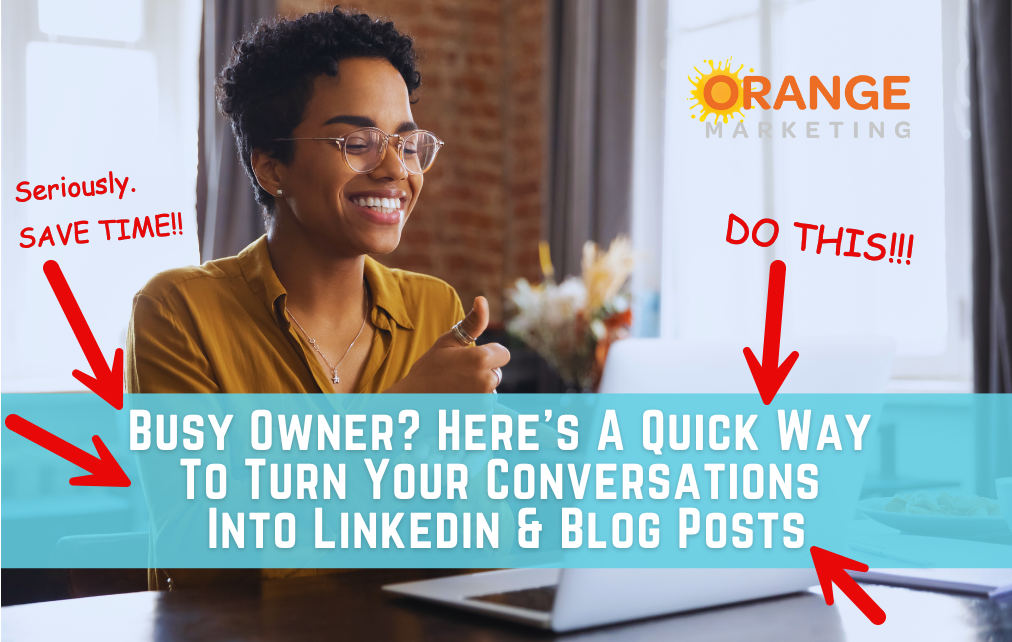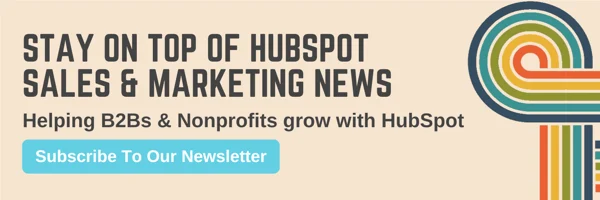5 min read
Busy Owner? Turn Your Conversations Into LinkedIn & Blog Posts!
![]() Rebecca Gonzalez
:
June 02, 2025
Rebecca Gonzalez
:
June 02, 2025

No sugarcoating it: you're swamped. Between client calls, putting out fires, and actually running your business, the last thing you want to think about is creating "content." The word alone probably makes you want to hide under your desk with a good cup of coffee and pretend LinkedIn doesn't exist.
But here's the thing—you're already creating incredible content every single day. You just don't realize it.
Every time you explain a solution to a client, answer the same question for the hundredth time, or walk someone through a process that seems totally obvious to you, you're creating content gold. What feels like "just doing your job" is actually valuable information that your prospects desperately need.
All examples that follow come from a real recorded conversation with a real business owner who provides accounting and bookkeeping solutions to restaurant owners. I took my own advice.
The "I've Said This 143 Times" Method
You know that feeling when a client asks you something and you think, "Seriously? I just explained this exact thing to someone else yesterday."? That's not frustration—that's your content calendar talking.
Step 1: Start a "Content Ideas" notebook (or note on your phone)
 Keep it somewhere you'll actually use it. Every time you catch yourself explaining something for what feels like the millionth time, jot it down. Don't overthink it—just write:
Keep it somewhere you'll actually use it. Every time you catch yourself explaining something for what feels like the millionth time, jot it down. Don't overthink it—just write:
- "Restaurant cash flow timing issues"
- "Why your POS reports don't match your books"
- "That thing about tip reporting again"
The secret: If you're explaining it repeatedly, other people need to know it too.
Turn Your Client Calls Into Blog Posts
Here's where it gets really simple. If you're already recording client calls (and if you're not, you should consider it for training purposes), you're sitting on a content goldmine.
Step 2: Mine your conversations
After a particularly good explanation or problem-solving session, send the recording (or your notes) to someone who can help you write (with assistance from Claude.ai). This could be:
- A marketing intern
- A freelance writer
- That social media-savvy niece who's always on her phone anyway
Tell them: "Around minute 12, I explain why restaurant owners struggle with inventory tracking. Can you turn this into a blog post?" Have your helper send it through ChatGPT or Claude.ai with a good prompt explaining the outline, your voice, your business, and what you are looking to do.
The magic: Your natural way of explaining things is often clearer and more relatable than anything you'd write from scratch.
The LinkedIn Post That Writes Itself
Once you have a blog post, you've got LinkedIn content ready to go. Here's the formula that actually works:
Step 3: The "Expert Insight" approach
- Share a key insight from your blog post
- Add your personal take or a quick story
- End with "I wrote more about this here" and link to your full blog post
Example: "Had another restaurant owner this week surprised that their 'profitable' month showed negative cash flow. Here's the thing most people don't realize about restaurant financials... [insert your wisdom here]. Wrote up the full explanation on how to avoid this cash flow trap—link in comments."
Pro tip: Don't put the blog link directly in your post. LinkedIn's algorithm doesn't love that. Put it in the first comment instead.
More pro tips: without getting you into your head too much, we wrote a whole post about LinkedIn posting tips.
The B2B Professional's Guide to Winning on LinkedIn https://blog.orangemarketing.com/the-b2b-professionals-guide-to-winning-on-linkedin
Your Email Inbox Is a Content Library
Look at your sent emails from the past month. I bet you'll find at least five different explanations you've given to clients about common problems.
Step 4: Email archaeology
 Search your sent folder for phrases like:
Search your sent folder for phrases like:
- "Here's how to..."
- "The reason this happens is..."
- "What you need to understand is..."
- "This is a common problem..."
Each of these emails is a blog post waiting to happen. Copy and paste the good stuff into a document, clean it up a bit, and boom—content.
The "For Experts Only" Psychology Trick
When you're worried a topic is too technical or inside-baseball, don't shy away from it. Instead, lean into it.
Start your post with something like:
- "This one's for the restaurant owners who really want to understand their numbers..."
- "If you're serious about your restaurant's financial health, this might help..."
- "Fellow restaurant operators—you know this pain point..."
Why this works: People like feeling smart and "in the know." When you position content as being for experts or serious business owners, they'll engage more because nobody wants to admit they're not an expert.
Make It a System, Not a Burden
The key to making this work is building it into what you're already doing, not adding more to your plate.
Step 5: Create your content system
- During client calls: Keep that notebook handy. When you explain something well, jot it down.
- Weekly review: Spend 10 minutes looking at your notes. Pick one topic for content.
- Get help: Whether it's an intern, a freelancer, or a family member, find someone who can help turn your expertise into polished content.
- Batch and schedule: Write several pieces at once when you're in the zone, then schedule them out.
Why Your Niche Content Matters More Than Ever
Before we go further, let's address the elephant in the room: "But doesn't AI make all this content stuff irrelevant? Why bother when ChatGPT can write anything?"
Here's the plot twist—AI actually makes your specialized content more valuable, not less.
Sure, AI can write generic business advice all day long. But can it write about the specific quirks of restaurant POS systems? The nuances of tip reporting in different states? The exact cash flow patterns of seasonal restaurants?
Absolutely not.
When someone searches for "restaurant bookkeeping tips," they don't want generic accounting advice. They want insights from someone who knows that March is brutal for most restaurants, that delivery app fees create specific reconciliation nightmares, and that inventory tracking for restaurants has unique challenges that don't exist in retail.
Your niche expertise is actually your moat against AI. The more specific and experience-based your content, the more irreplaceable it becomes. Google's algorithm is getting smarter about recognizing real expertise versus generic fluff, and your prospects can smell authentic, lived experience from a mile away.
Remember: You Know Things People Need
Here's what you need to understand: What seems totally obvious to you is revolutionary to your prospects. You've been doing this for years. You know the shortcuts, the pitfalls, the "why didn't anyone tell me this sooner" insights that could save someone thousands of dollars or hours of frustration.
Your expertise isn't commonplace—it just feels that way because it's your day job.
That restaurant owner texting you accounting software questions at 9 PM? She represents hundreds of other restaurant owners who need the same help. That accounting technique you explained that made someone's eyes light up with understanding? That's content that could help dozens of prospects find you.
The Bottom Line
You don't need to become a content creator. You just need to capture and share what you're already doing. Your daily work is full of valuable insights that your ideal clients are desperately searching for online.
Start small. Pick one conversation from this week that went really well, and turn it into a LinkedIn post. See what happens. Then do it again next week.
Because the truth is, you're not too busy to create content—you're too busy not to leverage the content you're already creating every single day.
What's one question you get asked constantly in your business? That's your next blog post right there.
 More Tips to Free Up Your Time...
More Tips to Free Up Your Time...
.png?width=200&height=127&name=NEW%20OM%20Blog%20Post%20Template%20%20USE%20THIS%20ONE%20(27).png) From Blog To LinkedIn To Inbox: HubSpot's Blog Newsletter And Social Media Automation In One
From Blog To LinkedIn To Inbox: HubSpot's Blog Newsletter And Social Media Automation In One
Tired of juggling blogs, social posts, and emails? HubSpot automates it all—learn how to save time and grow faster with Content Hub!
.png?width=200&height=127&name=NEW%20OM%20Blog%20Post%20Template%20USE%20THIS%20ONE(19).png) Why Buyers Crave Self-Help Tools - Get 'Em On Your Website!
Why Buyers Crave Self-Help Tools - Get 'Em On Your Website!
Buyers want answers, not sales calls. Add self-help tools to your site and turn curious clicks into qualified, ready-to-buy leads—no pitch required.
.png?width=200&height=127&name=NEW%20OM%20Blog%20Post%20Template%20USE%20THIS%20ONE(20).png) Show Them the Money: Why We Made Our Pricing Public—And What Happened Next
Show Them the Money: Why We Made Our Pricing Public—And What Happened Next
Why we made our B2B pricing public and how it led to faster sales cycles, better market positioning, and higher customer satisfaction.
